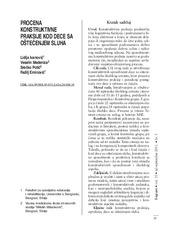Приказ основних података о документу
Assessment of constructive praxis in children with hearing impairments
Procena konstruktivne praksije kod dece sa oštećenjem sluha
| dc.creator | Ivanović, Lidija | |
| dc.creator | Medenica, Veselin | |
| dc.creator | Potić, Srećko | |
| dc.creator | Eminović, Fadilj | |
| dc.date.accessioned | 2021-06-09T13:43:17Z | |
| dc.date.available | 2021-06-09T13:43:17Z | |
| dc.date.issued | 2011 | |
| dc.identifier.issn | 0351-2665 | |
| dc.identifier.uri | http://rfasper.fasper.bg.ac.rs/handle/123456789/513 | |
| dc.description.abstract | Introduction. Constructive praxis represents a higher cognitive function and includes any activity in which the elements are assembled and organized to form a unit and implies the ability of good spatial perception of the whole and the parts. The ability of constructive praxis is necessary to cope with the educational process. Objective. The aim of this study is to determine the constructive abilities of children with hearing impairment of school age, through constructive praxis assessment and comparison of achievement of these children compared to control group. Method. The study included 46 schoolchildren aged 11 to 15 years, divided into experimental and control group. E group consisted of 22 subjects with impaired hearing, and the K group of 24 normal hearing subjects from the population of school children. Paper and pencil drawing task from the MSE battery was used for abilities assessment. Results. The results show that, contrary to our assumption based on data from the literature, there is a difference in the constructive capabilities between the examined groups in favor of the control group, where the difference is statistically significant in one of the three tasks. Also, it appears that with normal hearing and children with hearing impairments, constructive abilities positively correlated with the school grade, and there is no connection between the constructive abilities and school success. Conclusion. In further research is necessary to acknowledge and take into account the impact of model changes, then the influence of the type and structure of constructive tasks, and neuropsychological analysis, which can help us differentiate architecture of cognition deficits that interfere with the constructive aspects of the task. | en |
| dc.description.abstract | Uvod. Konstruktivna praksija predstavlja višu kognitivnu funkciju i podrazumeva bilo koju aktivnost u kojoj se elementi sklapaju ili organizuju tako da čine jednu celinu i ta sposobnost podrazumeva dobro prostorno opažanje delova celine i njihovog međusobnog odnosa. Na sposobnostima konstruktivne praksije zasniva se grafomotorni čin, neophodan za uspešno savladavanje vaspitno-obrazovnog procesa. Cilj rada. Cilj ovog rada je utvrđivanje konstruktivnih sposobnosti dece sa oštećenjem sluha školskog uzrasta, kroz procenu konstruktivne praksije i poređenje postignuća ove dece u odnosu na čujeću. Metod rada. Istraživanjem je obuhvaćeno 46 ispitanika školskog uzrasta i starosne dobi od 11 do 15 godina, podeljenih u Eksperimentalnu i Kontrolnu grupu. E grupu je činilo 22 ispitanika sa oštećenjem sluha, a K grupu 24 ispitanika iz čujuće populacije školske dece. Procena je vršena Testom crtanja na nalog, iz baterije MSE. Rezultati. Rezultati pokazuju da, nasuprot našoj pretpostavci zasnovanoj na podacima iz literature, postoji razlika u konstruktivnim sposobnostima između ispitivanih grupa, u korist kontrolne grupe, pri čemu je ta razlika statistički značajna na jednom od tri zadatka Testa crtanja na nalog i na komparaciji kompozitnih skorova. Takođe, pokazalo se da su i kod čujuće i kod dece sa oštećenjem sluha, konstruktivne sposobnosti u pozitivnoj korelaciji sa razredom, kao i da ne postoji veza između konstruktivnih sposobnosti i školskog uspeha. Zaključak. U daljim istraživanjima neophodno je uvažiti i uzeti u obzir uticaj promene modela, zatim uticaj vrste i strukture grafomotornih i konstruktivnih zadataka, kao i neuropsihološku analizu, kojom je moguće sagledati arhitekturu kognicije i diferencirati deficite izvršnog dela zadatka od deficita koji ometaju perceptivne i konstruktivne aspekte zadatka. | sr |
| dc.publisher | Klinički centar Srbije - Klinika za psihijatriju, Beograd i Udruženje psihijatara Srbije, Beograd | |
| dc.rights | openAccess | |
| dc.source | Engrami | |
| dc.subject | constructive praxis | en |
| dc.subject | apraxia | en |
| dc.subject | children with hearing impairments | en |
| dc.subject | konstruktivna praksija | sr |
| dc.subject | apraksija | sr |
| dc.subject | deca sa oštećenjem sluha | sr |
| dc.title | Assessment of constructive praxis in children with hearing impairments | en |
| dc.title | Procena konstruktivne praksije kod dece sa oštećenjem sluha | sr |
| dc.type | article | |
| dc.rights.license | ARR | |
| dc.citation.epage | 30 | |
| dc.citation.issue | 3 | |
| dc.citation.other | 33(3): 19-30 | |
| dc.citation.rank | M24 | |
| dc.citation.spage | 19 | |
| dc.citation.volume | 33 | |
| dc.identifier.fulltext | http://rfasper.fasper.bg.ac.rs/bitstream/id/488/510.pdf | |
| dc.identifier.rcub | https://hdl.handle.net/21.15107/rcub_rfasper_513 | |
| dc.type.version | publishedVersion |


